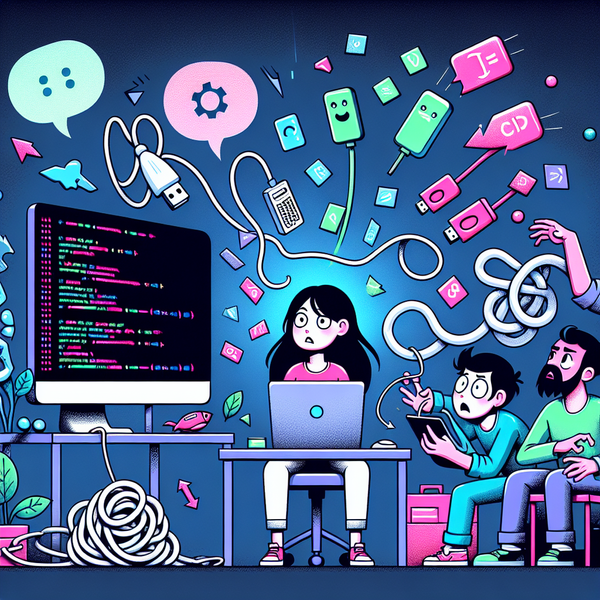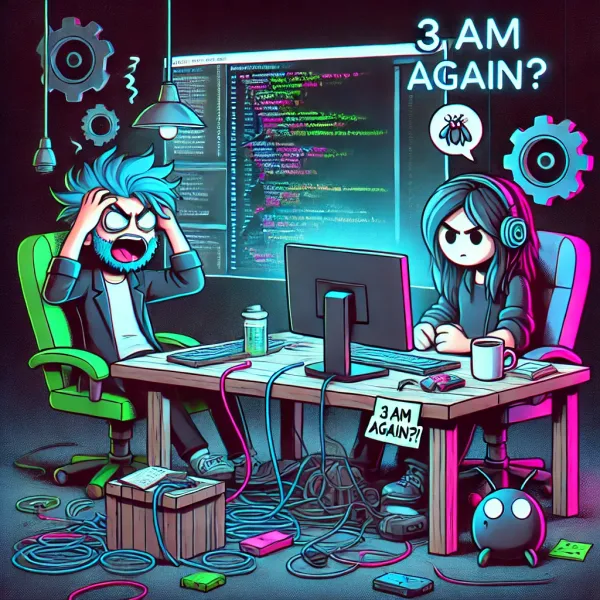Logical Thinking and Its Role in Software Development
Mitigate human error and enhance code quality when solving problems with logical thinking.

Logical thinking—often seen as crucial in software development. If you’ve ever been knee-deep in tangled code, you’ll know that logical thinking is not just helpful but necessary. This article will explore the significance of logical thinking in software development and why it’s every developer’s best tool (besides caffeine, of course).
🔑 Key Takeaways 🔑
- Logical thinking is important for error prevention, problem-solving, and code optimization in software development.
- Most software bugs stem from human error, which logical thinking helps mitigate (because, surprise, humans make mistakes).
- Logical thinking can enhance code quality and reduce development time.
- It fosters collaboration and better user experience, leading to satisfied users and stakeholders.
What is Logical Thinking?
Logical thinking allows you to sift through information, spot patterns, and make evidence-based decisions. It helps evaluate information, eliminate errors, and draw sound conclusions. In software development, where a missing semicolon can lead to hours of frustration, logical thinking is essential—because nobody wants to spend their day hunting for that one rogue character.
Role of Logical Thinking in Software Development
Error Prevention
Ever heard the phrase, "To err is human"? In software development, human error causes most software bugs. Logical thinking helps developers spot potential errors and bugs before they become bigger problems. It's like having an internal alarm that screams, "Hey, maybe don't do that!"
Problem-Solving
Logical thinking allows developers to break down complex problems into manageable parts. It’s about identifying key issues and crafting effective solutions, turning unsolvable challenges into smaller, solvable tasks. Kind of like turning a dragon into a bunch of tiny, more manageable lizards.
Code Optimization
When code is running inefficiently, logical thinking helps analyze it and find areas for improvement. Developers can optimize for better performance and scalability. Who doesn’t want their code to run faster? Slow code is just another way of saying, "Please, let’s make our users suffer."
Requirements Analysis
Logical thinking is needed to understand and analyze software requirements. It ensures the software meets user and stakeholder needs, preventing those "this isn’t what I wanted" conversations later. Because nothing says "fun" like redoing an entire project because you misread the requirements.
Testing and Validation
Logical thinking is crucial for designing and executing effective tests. This ensures that software functions properly and meets standards. To improve testing skills, explore debugging strategies. Testing: because "it works on my machine" isn’t good enough.

Interesting Facts
- 80% of Software Bugs are Caused by Human Error: Logical thinking helps minimize these errors. Maybe someday we’ll make fewer mistakes, but today is not that day.
- Logical Thinking Can Improve Code Quality: Research shows it enhances code quality significantly. So, basically, think logically or end up with code you’ll regret.
- The Average Developer Spends 20% of Their Time Debugging: Logical thinking can save time. Imagine what you could do with that extra time—maybe even take a lunch break.
- Logical Thinking Can Reduce Development Time: It helps developers work efficiently. Less time flailing, more time coding.
- Logical Thinking is Key for Software Developers: Most developers consider it essential. If you don’t, you might want to reconsider your life choices.
Benefits of Logical Thinking in Software Development
Improved Code Quality
Logical thinking helps developers write code that is efficient, scalable, and maintainable. For further reading on maintaining code quality, check out our piece on legacy code. Trust us, your future self will be grateful.
Reduced Debugging Time
Errors are identified and fixed early, reducing time spent on debugging. More time for other tasks and fewer late nights. Debugging is necessary, but nobody wants it to become a lifestyle.
Increased Productivity
Logical thinking allows developers to work smarter, completing tasks faster and meeting deadlines with less stress. And who doesn’t want more time to catch up on that TV series everyone else seems to have already watched?
Better Collaboration
Logical thinking fosters effective communication and collaboration. It improves teamwork and software development outcomes. For more on enhancing teamwork, explore our article on collaborative problem-solving. Because nothing beats the joy of explaining your brilliant idea to someone who just doesn’t get it... until they finally do.
Improved User Experience
Logical thinking ensures that software meets user needs, leading to a better user experience and increased satisfaction. Because happy users mean fewer complaints, and fewer complaints mean more time for actual development.
In conclusion, logical thinking is not just a skill—it is a cornerstone of effective software development. By using logical thinking, developers can enhance code quality, streamline debugging, boost productivity, and create software that meets user needs. The next time you face a coding challenge, remember that logical thinking is your trusted ally, always ready to save the day (or at least save you a headache).




